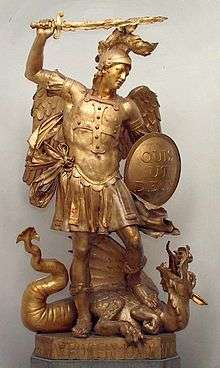Deus
| Part of a series on |
| God |
|---|
|
In particular religions |
|
| Look up deus in Wiktionary, the free dictionary. |
Deus (Latin pronunciation: [ˈdeːʊs]) is Latin for "god" or "deity". Latin deus and dīvus "divine", are descended from Proto-Indo-European *deiwos, "celestial" or "shining", from the same root as *Dyēus, the reconstructed chief god of the Proto-Indo-European pantheon. Compare Greek Zeus (Ζεύς dzeus; Aeolic Greek Δεύς deus) and Sanskrit देव deva. Latin dies ("day") is considered to have derived from the same PIE root that originated deus. This is to say that a celestial shining body, the Sun, gives material form to the words for "day" in the Romance Languages.
In Classical Latin, deus (feminine dea) was a general noun[1] referring to a deity, while in technical usage a divus or diva was a figure who had become divine, such as a divinized emperor. In Late Latin, Deus came to be used mostly for the Christian God. It was inherited by the Romance languages in French Dieu, Spanish Dios, Portuguese and Galician Deus, Italian Dio, etc., and by the Celtic languages in Welsh Duw and Irish Dia.
Latin Bible
Latin deus consistently translates Greek θεός theos in both the Vetus Latina and Jerome's Vulgate. In the Septuagint, Greek theos in turn renders Hebrew Elohim (אֱלוֹהִים, אלהים).
In theological terminology
The word de-us is the root of Deity, and thereby of deism, pandeism, panendeism, and polydeism, ironically all of which are theories in which any divine figure is absent from intervening in human affairs. This curious circumstance originates from the use of the word "deism" in the 17th and 18th centuries as a contrast to the prevailing "theism", belief in an actively intervening God:
The new religion of reason would be known as Deism. It had no time for the imaginative disciplines of mysticism and mythology. It turned its back on the myth of revelation and on such traditional "mysteries" as the Trinity, which had for so long held people in the thrall of superstition. Instead it declared allegiance to the impersonal "Deus".[2]
Followers of these theories, and occasionally followers of pantheism, may sometimes refer to God as "Deus" or "the Deus" to make clear that the entity being discussed is not a theistic "God". Arthur C. Clarke picks up this usage in his novel 3001: The Final Odyssey. William Blake said of the Deists that they worship "the Deus of the Heathen, The God of This World, & the Goddess Nature, Mystery, Babylon the Great, The Druid Dragon & hidden Harlot".[3]
In Cartesian philosophy, the phrase deus deceptor is sometimes used to discuss the possibility of an evil God that seeks to deceive us. This character is related to a skeptical argument as to how much we can really know if an evil demon were attempting to thwart our knowledge. Another is the deus otiosus ("idle god"), a theological concept used to describe the belief in a creator god who largely retires from the world and is no longer involved in its daily operation. A similar concept is that of the deus absconditus ("hidden god") of Thomas Aquinas. Both refer to a deity whose existence is not readily knowable by humans through either contemplation or examination of divine actions. The concept of deus otiosus often suggests a god who has grown weary from involvement in this world and who has been replaced by younger, more active gods, whereas deus absconditus suggests a god whom humans are incapable of seeing,[4] or who has consciously left this world to hide elsewhere.
Latin phrases with "deus"

Nobiscum deus ("God with us") was a battle cry of the late Roman Empire and of the Byzantine Empire. The name Amadeus translates to "for love of God". The genitive/dative dei occurs in such phrases as Roman Catholic organization Opus Dei (work of God), Agnus Dei (Lamb of God) and Dei Gratia (By the Grace of God).
- Agnus Dei
- Deus ex machina
- Deus otiosus/Deus absconditus
- Deus vult
- Munificentissimus Deus
- Opus Dei
- Providentissimus Deus
- Rector Potens, Verax Deus
- Regnator omnium deus
- Rerum Deus Tenax Vigor
- Rex Deus
- Sublimus Dei
- Te Deum
- Unigenitus dei filius
- Vox populi, vox Dei
See also
- God (word) (the Germanic word)
References
- ↑ Generale nomen: Servius, note to Aeneid 12.139.
- ↑ Karen Armstrong, A History of God (1993), page 310.
- ↑ Samuel Foster Damon, Morris Eaves, A Blake dictionary: the ideas and symbols of William Blake, 1988, page 103.
- ↑ Nikoletseas, Michael M. (2014). Deus Absconditus - The Hidden God. ISBN 978-1495336225